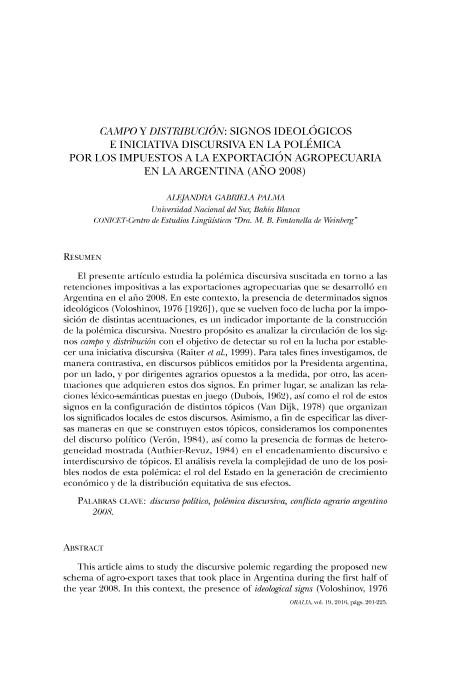Artículo
El presente artículo estudia la polémica discursiva suscitada en torno a las retenciones impositivas a las exportaciones agropecuarias que se desarrolló en Argentina en el año 2008. En este contexto, la presencia de determinados signos ideológicos (Voloshinov, 1976 [1926]), que se vuelven foco de lucha por la imposición de distintas acentuaciones, es un indicador importante de la construcción de la polémica discursiva. Nuestro propósito es analizar la circulación de los signos campo y distribución con el objetivo de detectar su rol en la lucha por establecer una iniciativa discursiva (Raiter et alli, 1999). Para tales fines investigamos, de manera contrastiva, en discursos públicos emitidos por la Presidenta Argentina, por un lado, y por dirigentes agrarios opuestos a la medida, por otro, las acentuaciones que adquieren estos dos signos. En primer lugar, se analizan las relaciones léxico-semánticas puestas en juego (Dubois, 1962), así como el rol de estos signos en la configuración de distintos tópicos (Van Dijk, 1978) que organizan los significados locales de estos discursos. Así mismo, a fin de especificar las diversas maneras en que se construyen estos tópicos, consideramos los componentes del discurso político (Verón, 1984), así como la presencia de formas de heterogeneidad mostrada (Authier-Revuz, 1984) en el encadenamiento discursivo e interdiscursivo de tópicos. El análisis revela la complejidad de uno de los posibles nodos de esta polémica: el rol del Estado en la generación de crecimiento económico y de la distribución equitativa de sus efectos. This article aims to study the discursive polemic regarding the proposed new schema of agro-export taxes that took place in Argentina during the first half of the year 2008. In this context, the presence of ideological signs (Voloshinov, 1976 [1926]), that are the focus of discursive struggles for the imposition of different accentuations, becomes an important indicator of the construction of the discursive polemic. The purpose of this paper is to analyze the circulation of the signs campo and distribución, in particular, with the objective of determining their role in the struggle to establish discursive iniciative (Raiter et al., 1999) within said polemic. To that end, we analyze and contrast, in public speeches of the argentinean President, on the one hand, and of leaders of the agrarian organizations oposed to the new tax, on the other, the acentuations that these two signs acquire. In the first place, we consider the lexical-semantic relations at play (Dubois, 1962), as well as the role of these signs in the configuration of different topics (Van Dijk, 1978) that organize these discourses’ local meanings. Furthermore, in order to specify the various ways in which these topics are constructed, we also take into account the components of political discourse defined by Verón (1984), as well as the presence of forms of manifest heterogeneity (Authier-Revuz, 1984) in the discursive and interdiscursive linkage of topics. The analysis reveals the complexity of one of the possible nodes of this polemic: the role of the State in the generation of economic growth and the equitable distribution of its effects.
Campo y distribución: Signos ideológicos e iniciativa discursiva en la polémica por los impuestos a la exportación agropecuaria en la Argentina (año 2008)
Fecha de publicación:
12/2016
Editorial:
Arco Libros
Revista:
Oralia
ISSN:
1575-1430
Idioma:
Español
Tipo de recurso:
Artículo publicado
Clasificación temática:
Resumen
Palabras clave:
DISCURSO POLÍTICO
,
POLÉMICA DISCURSIVA
,
CONFLICTO AGRARIO ARGENTINO 2008
Archivos asociados
Licencia
Identificadores
Colecciones
Articulos(CCT - BAHIA BLANCA)
Articulos de CTRO.CIENTIFICO TECNOL.CONICET - BAHIA BLANCA
Articulos de CTRO.CIENTIFICO TECNOL.CONICET - BAHIA BLANCA
Citación
Palma, Alejandra Gabriela; Campo y distribución: Signos ideológicos e iniciativa discursiva en la polémica por los impuestos a la exportación agropecuaria en la Argentina (año 2008); Arco Libros; Oralia; 19; 12-2016; 203-227
Compartir
Altmétricas




